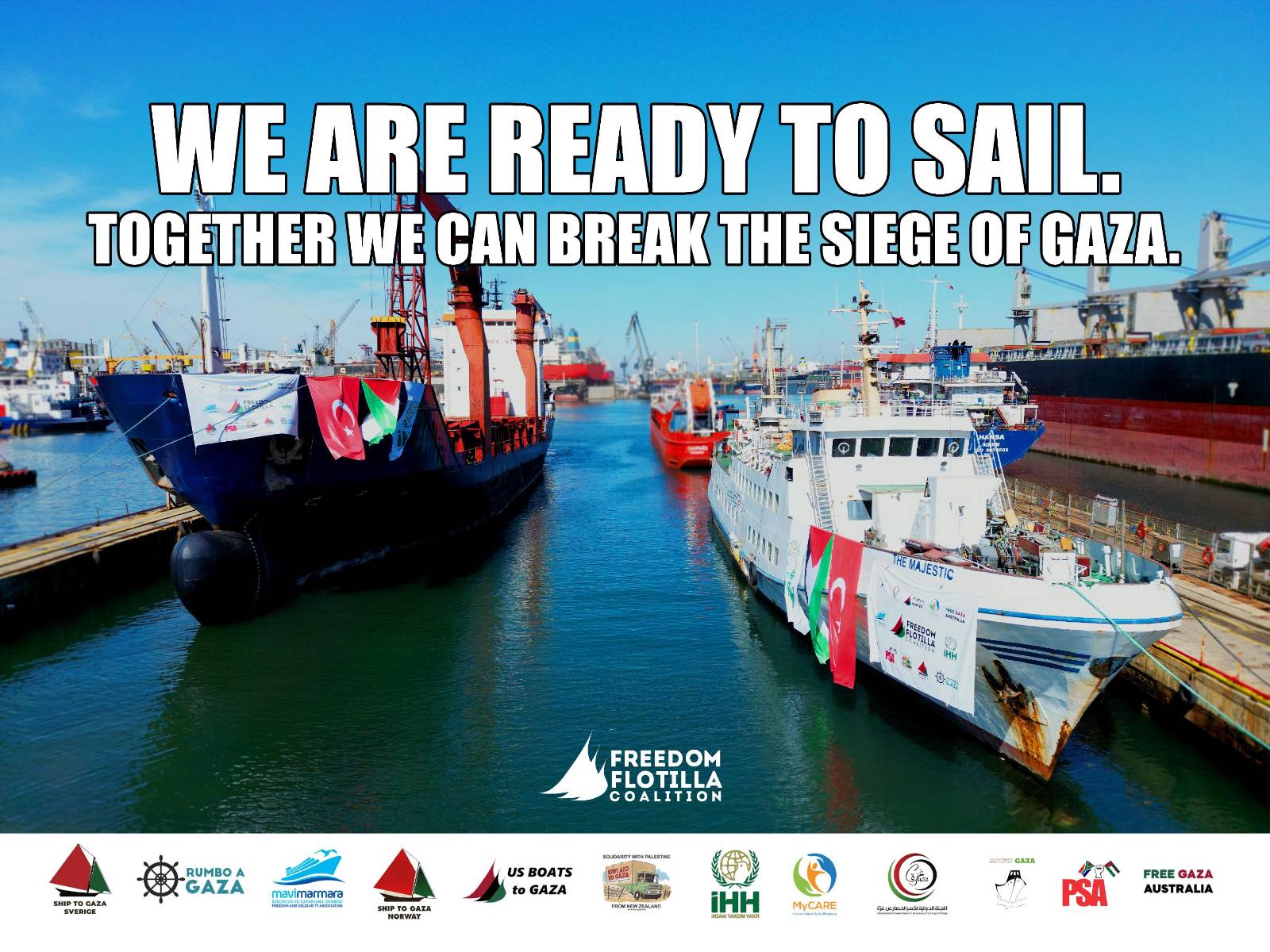Driven by humanitarian urgency, a major flotilla, officially named the Global Sumud Flotilla, embarked from Barcelona on Sunday, August 31, 2025, aiming to challenge the long-standing Israeli naval blockade of the Gaza Strip. This ambitious endeavor seeks to deliver essential aid and draw global attention to the dire circumstances within Gaza. Organizers are calling it the largest-ever attempt to breach the blockade, highlighting the critical need for humanitarian assistance and the establishment of a sea corridor to the region.
The Global Sumud Flotilla
The Global Sumud Flotilla represents a broad international coalition, uniting activists and delegations from 44 countries. The convoy, which initially comprised approximately 20 boats departing from Barcelona, is projected to expand to around 70 vessels as it progresses through the Mediterranean, gathering additional ships from ports in Italy and Tunisia. The fleet’s anticipated arrival in Gaza is scheduled for around September 14 or 15, marking a significant moment in the ongoing efforts to support the region.
Key Participants
The flotilla includes several high-profile figures, underscoring the gravity of the mission. Among the participants is Swedish climate activist Greta Thunberg, who previously faced deportation by Israel in June following a similar attempt to deliver aid. Also present is former Barcelona mayor Ada Colau, alongside numerous European lawmakers and other public figures, according to reports from The Times of Israel. Their involvement highlights the international concern and support for the Palestinian people.
Humanitarian Cargo
The vessels are laden with critical humanitarian supplies, including essential food, water, and medicine. According to flotilla spokesperson Saif Abukeshek, a primary objective is to alleviate the suffering caused by the declared famine in parts of Gaza, where an estimated half a million people face catastrophic levels of hunger. The supplies are intended to provide immediate relief and to underscore the urgent need for sustained humanitarian access, as reported by Al Jazeera.
Objectives and Motivations
The Global Sumud Flotilla has dual objectives: to deliver much-needed aid directly to the people of Gaza and to establish a permanent humanitarian sea corridor, thereby breaking the 18-year-long Israeli blockade. Organizers emphasize the dire humanitarian situation in Gaza, citing reports of widespread hunger and deprivation. These concerns are echoed by activists who condemn the blockade as a form of collective punishment, with Saif Abukeshek describing the situation as an intentional starvation and “ongoing genocide” of the Palestinian people, as stated in a press release covered by AP News.
Challenging the Blockade
The flotilla directly challenges Israel’s control over maritime access to Gaza, a blockade that Israel maintains to prevent weapons from reaching Hamas. Israel has intensified its offensive on Gaza City, which organizers claim is limiting aid deliveries to the northern part of the territory, further exacerbating the humanitarian crisis. Previous attempts to breach the blockade have been met with interception by Israeli forces, resulting in detentions and deportations, as experienced by Greta Thunberg in June, according to The Guardian.
Potential Impacts and Regional Tensions
The departure of such a large-scale flotilla is expected to intensify international scrutiny of the humanitarian crisis in Gaza and the Israeli blockade. The success or failure of this endeavor, and Israel’s response, will significantly impact future efforts to deliver aid by sea and could further escalate tensions in the region. European lawmakers on board are expected to exert diplomatic pressure to ensure safe passage, while activists hope to galvanize public support for lifting the blockade. The mission’s timing coincides with heightened tensions due to the ongoing conflict, potentially leading to a volatile situation should Israel choose to intercept the flotilla, according to analysis from Yahoo News Canada and Yahoo News UK.
A Humanitarian Sea Corridor
Establishing a humanitarian sea corridor represents a long-term goal for the organizers. They aim to create a sustainable and secure route for the delivery of aid, bypassing the restrictions imposed by the blockade. This would not only provide immediate relief but also contribute to the long-term stability and recovery of Gaza, as argued by various public figures involved in the flotilla, as reported by The Jerusalem Post. The viability of this corridor hinges on international cooperation and the willingness of Israel to permit unimpeded access.
The International Response
The international community is closely monitoring the progress of the Global Sumud Flotilla. The mission has garnered support from various human rights organizations, advocacy groups, and political figures who view the blockade as a violation of international law. However, opinions remain divided, with some governments expressing concern over potential security risks and the possibility of the flotilla being exploited by Hamas, according to a report by Straight Arrow News. The response from key international actors will play a crucial role in determining the outcome of the mission and its broader implications for the region.
In conclusion, the Global Sumud Flotilla represents a significant undertaking aimed at addressing the humanitarian crisis in Gaza and challenging the Israeli blockade. Its success hinges on navigating complex political and security challenges, securing safe passage, and galvanizing international support for a sustainable solution to the ongoing crisis. The world watches as this flotilla approaches Gaza, hoping for a peaceful resolution and a step towards alleviating the suffering of the Palestinian people.


